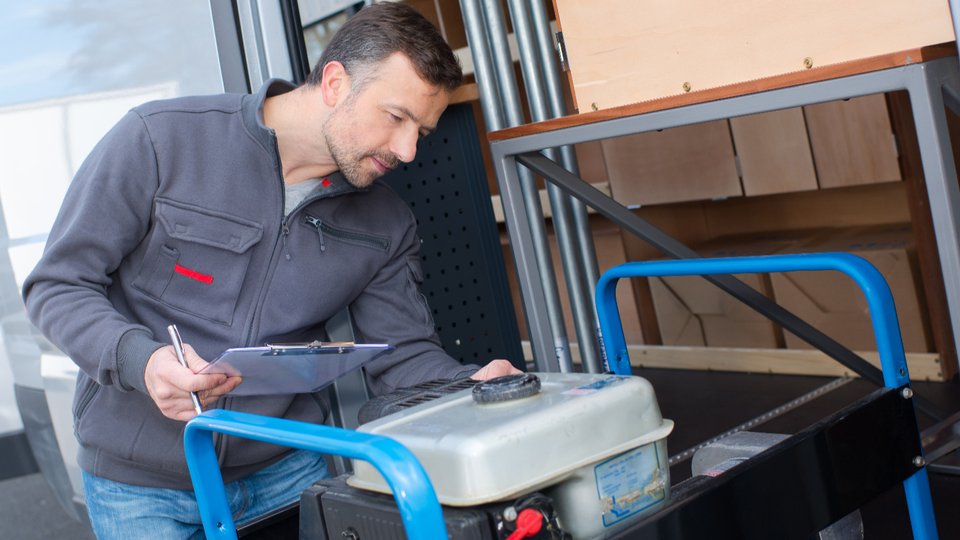Equipment & Supplies
How To: Selecting the right generator for a food truck
Whether you’re starting a food truck or looking to upgrade your existing truck, many different things can impact success. One is the type of generator you choose.

April 17, 2023
Whether you're starting a food truck or looking to upgrade your existing truck, many different things can impact your success.
One such thing is the type of generator you choose. In this article, we'll investigate the various types of food truck generators, the differences between them, and how to choose the best generator for your food truck.
Types of food truck generators
There are three different types of generators for food trucks: inverter generators, portable generators, and built-in generators.
An inverter generator uses an alternator to invert electricity and power your appliances. They are often more quiet, light, and convenient to use on a food truck than other generators. They also generate power in a cleaner, more sustainable way. It's important to note that these generators are often more expensive than their counterparts and typically produce less power in the long run.
What Is a Portable Generator?
Portable generators typically run on gas and use an on-board alternator to generate power. They are often thought of as the traditional way to power a food truck. These generators produce more power at a lower cost, making them the most cost-efficient option. However, they are often heavier and louder than their counterparts.
What Is a Built-In Generator?
A built-in generator is a generator included in the design of your food truck. They typically work best for larger trucks and are meant to fit inside a generator compartment. Though they are convenient and often produce the most power, these generators are not ideal for crowded kitchens or food trucks with limited space.
The best generator for a food truck is determined by the type of truck, what it sells, and the preferences of the owner. Each food truck's needs can vary, and no generator will work for every situation.
Some important factors to take into account when deciding which generator works best for your food truck include:
Cost: Before deciding on a food truck generator, be sure to set a budget. Ask yourself how much you are willing to pay and what you expect at that price point.
Power: To find the minimum amount of power you'll need, calculate the total wattage of all appliances and electronics required for your truck to function. If an appliance doesn't list a required wattage, you can calculate it by multiplying the number of volts required by the number of amps.
Run time: Consider how long you'll need a generator to function as you decide which one you'll buy. For example, if you only plan on operating your food truck a few hours a day, you may not need as powerful of a generator. Conversely, if you plan on operating longer, a more expensive generator may be required.
Fuel capacity: The design of your food truck can impact your fuel requirements. If you plan on using an external gas-powered generator, you'll need to manually fuel it. Conversely, a built-in generator is typically connected to the truck's gas tank and can fuel itself automatically.
Noise: As you choose a generator, keep local laws and regulations in mind. Some cities may have laws prohibiting generators that produce sound over a certain decibel range, meaning that you will be limited in where you can park. For these reasons, it's essential that you check with local authorities before purchasing a generator.
Size: Keep the layout of your food truck in mind when purchasing a generator. Choosing one that is too large can impact your ability to make the most of a limited kitchen space.
Exhaust: Most generators will give off some kind of exhaust, making it important to install a proper ventilation system. This helps to maintain the health of your guests, employees, and yourself.
What size generator is needed?
The size of generator you buy for your food truck is dependent on how much power the truck uses and your hours of operation. It's important to find a generator that is the right size to ensure that you always have enough power to stay open. If the generator fails or you don't have one that can provide enough power, it can result in a significant amount of revenue lost.
How to Calculate Wattage for Generator
To determine what size and power capacity you'll need in a food truck generator, it's important to know the minimum amount of power your food truck will need. This is typically represented in watts, or wattage. To calculate wattage, follow these steps:
- Record wattage: Most equipment on your food truck should have a wattage listed somewhere on it. Go through every appliance that you plan on using and record how much power it requires.
- Calculate missing wattage: If an appliance does not come with a listed wattage, you can find it using a simple equation. To calculate how many watts a device needs to operate, multiply the number of volts by the number of amps.
- Calculate sum: Once you've determined how many watts each appliance on board your food truck requires, add them together. This gives you the minimum amount of power you will need from your generator.
Though not every generator is the same, they can be organized into general groups. Below, we've listed the different generator sizes and how much electricity they can provide:
- Small: A small generator typically produces up to 4,000 watts.
- Medium: To be considered medium, a generator must produce up to 6,000 watts.
- Large: Large generators are usually capable of producing up to 8,000 watts.
It's important to note that not every generator will fit into a classification of small, medium, or large. Some may fall somewhere in between, while others can significantly exceed the output of large generators.
Whether you don't have experience buying a generator or just need to refresh yourself on the details, there are many questions you will need answered. Below, we've compiled a list of frequently asked questions about the subject.
The cost of a generator
A food truck generator typically costs somewhere between $500 to $3,000, though some can be priced outside of this range based on which model you buy.
Among various factors, a commercial generator's cost depends on what type of generator it is, how much power it produces, and any additional features it may include.
Connecting a generator
Depending on what kind of generator you purchase, you may need a generator plug and various accessories to power your appliances. Be sure to read your generator's user manual to understand what you'll need to connect your generator.
Food truck generators are reliable and efficient, especially when compared to other food truck power sources. Below, we've listed two of the most popular food truck power alternatives as well as their advantages and disadvantages.
Generator alternatives
Solar panels: Solar power is the most eco-friendly option when it comes to powering your food truck. On the downside, purchasing solar panels and storing solar energy can be expensive and your energy is often weather-dependent.
Propane tanks: Propane is a versatile way to power your food truck. It is convenient and often cost-effective. However, propane is more flammable than natural gas, which can come with safety concerns. Additionally, propane tanks can be subject to strict rules and regulations from local governments, meaning that your truck may not be able to operate in certain areas.
 ChatGPT
ChatGPT Grok
Grok Perplexity
Perplexity Claude
Claude





